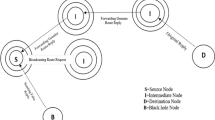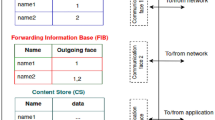Abstract
In a wireless ad hoc network, nodes share a broadcast channel through a Medium Access Control protocol. The broadcasting channel is a scarce resource, so MAC algorithms must reduce collisions and ensure high network throughput. The IEEE 802.11 MAC protocol used in ad hoc networks can lead to unfairness in channel utilization among flows, some nodes may grab the channel for a long time and deprive the other nodes of accessing the channel. In this paper, a new approach to make the Medium Access Control in wireless ad hoc networks more efficient and fairer is proposed. This approach is based on a service differentiation between the nodes of the network by taking into account, for each node, the number of its outgoing flows. The principle of this approach is to give a node a bandwidth that must be proportional to the number of its outgoing flows. In that way, if a node has more outgoing flows than another or is more involved in routing than another it will have a high priority to access the channel. As a consequence of this approach, the network won’t break down because of the cooperation of all the nodes of the network, and bandwidth sharing will be fairer and more efficient.














Similar content being viewed by others
References
Nait-Abdesselam, F., & Koubaa, H. (2005). Towards routing-aware adaptive medium access control in wireless ad hoc networks. International Journal of Wireless and Mobile Computing, 1(2).
Bensaou, B., Wang, Y., & Ko, C. C. (2000). Fair medium access in 802.11 based wireless ad-hoc networks. In Proceedings of the 1st ACM international symposium on mobile ad hoc networking & computing, MobiHoc ’00 (pp. 99–106). IEEE Press, Piscataway, NJ. http://dl.acm.org/citation.cfm?id=514151.514166.
Bharghavan, V., Demers, A., Shenker, S., & Zhang, L. (1994). MACAW: A media access protocol for wireless LAN’s. SIGCOMM Computer Communication Review, 24(4), 212–225. https://doi.org/10.1145/190809.190334.
Bianchi, G. (2000). Performance analysis of the IEEE 802.11 distributed coordination function. IEEE Journal on Selected Areas in Communications, 18(3), 535–547. https://doi.org/10.1109/49.840210.
Edalat, Y., & Obraczka, K. (2019). Dynamically tuning IEEE 802.11’s contention window using machine learning. In Proceedings of the 22nd international ACM conference on modeling, analysis and simulation of wireless and mobile systems, MSWIM ’19 (pp. 19–26). Association for Computing Machinery, New York, NY. https://doi.org/10.1145/3345768.3355920. https://doi-org.www.sndl1.arn.dz/10.1145/3345768.3355920.
Giang, P., & Nakagawa, K. (2009). Achieving fairness over 802.11 multihop wireless ad hoc networks. IEICE Transactions on Communications, 92(8), 2628–2637.
Guang, L., Assi, C. M., & Benslimane, A. (2008). Enhancing IEEE 802.11 random backoff in selfish environments. IEEE Transactions on Vehicular Technology, 57(3), 1806–1822. https://doi.org/10.1109/TVT.2007.909291.
Hiertz, G., Denteneer, T., Stibor, L., Zang, Y., Costa-Pérez, X., & Walke, B. (2010). The IEEE 802.11 universe. IEEE Communications Magazine, 48, 62–70. https://doi.org/10.1109/MCOM.2010.5394032.
Huang, X. L., & Bensaou, B. (2001). On max–min fairness and scheduling in wireless ad-hoc networks: Analytical framework and implementation. In Proceedings of the 2nd ACM international symposium on mobile Ad Hoc networking & Computing, MobiHoc ’01 (pp. 221–231). ACM, New York, NY. https://doi.org/10.1145/501445.501447.
IEEE Standard for Wireless LAN medium access control (MAC) and physical layer (PHY) specifications. IEEE Std 802.11-1997, pp. 1–445 (2019). https://doi.org/10.1109/IEEESTD.1997.85951.
Jagadev, N., Pattanayak, B., Singh, D., & Sahoo, S. (2018). A survey on bandwidth management in manet. International Journal of Engineering and Technology (UAE). https://doi.org/10.14419/ijet.v7i3.4.14672.
Jiang, L. B., & Liew, S. C. (2008). Improving throughput and fairness by reducing exposed and hidden nodes in 802.11 networks. IEEE Transactions on Mobile Computing, 7(1), 34–49. https://doi.org/10.1109/TMC.2007.1070.
Jun, B., & Nam, J. (2013). Modified backoff algorithm considering priority in IEEE 802.11. Advanced Science and Technology Letters, 44, 32–35.
Karn, P. (1990). MACA: A new channel access method for packet radio. In ARRL/CRRL amateur radio 9th computer networking conference.
Lei, J., Wang, Y., & Yun, H. (2019). Decoupling-based channel access mechanism for improving throughput and fairness in dense multi-rate wlans. Future Internet, 12, 3. https://doi.org/10.3390/fi12010003.
Mehaoued, K., Sekhri, L., & Bourenane, M. (2014). Fairness improvement of MAC in wireless ad hoc networks. In Proceedings of the 8th international workshop on verification and evaluation of computer and communication systems, VECoS 2014, Bejaïa, Algeria, September 29–30, 2014 (pp. 143–147). http://ceur-ws.org/Vol-1256/poster5.pdf.
Mousavi, S., Sadeghi, R., Karimi, M., Karimian, E., & Aghaei, M. (2018). A fair cooperative mac protocol in IEEE 802.11 WLAN. Future Internet, 10, 39. https://doi.org/10.3390/fi10050039.
Ramanathan, P., & Hamdaoui, M. (1995). A dynamic priority assignment technique for streams with (m, k)-firm deadlines. IEEE Transactions on Computers, 44(12), 1443–1451. https://doi.org/10.1109/12.477249.
Razafindralambo, T., & Lassous, I. G. (2009). SBA: a simple backoff algorithm for wireless ad hoc networks. In International conference on research in networking (pp. 416–428). Springer.
Sarr, C., Chaudet, C., Chelius, G., & Guérin Lassous, I. (2008). Bandwidth estimation for IEEE 802.11-based ad hoc networks. IEEE Transactions on Mobile Computing, 7(10), 1228–1241. https://doi.org/10.1109/TMC.2008.41.
Seth, D., Patnaik, S., & Pal, S. (2011). A faired quality of service assured MAC protocol for mobile ad hoc network and its performance evaluation. International Journal of Wireless & Mobile Networks. https://doi.org/10.5121/ijwmn.2011.3205.
SHI, H., Prasad, R. V., Onur, E., & Niemegeers, I. G. M. M. (2014). Fairness in wireless networks: Issues, measures and challenges. IEEE Communications Surveys Tutorials, 16(1), 5–24. https://doi.org/10.1109/SURV.2013.050113.00015.
Su, X., Chan, S., & Manton, J. H. (2010). Bandwidth allocation in wireless ad hoc networks: Challenges and prospects. IEEE Communications Magazine, 48(1), 80–85. https://doi.org/10.1109/MCOM.2010.5394034.
Tuan, N. M., Nakagawa, K., & Watabe, K. (2015). A method at link layer to improve the fairness in multi-hop wireless ad hoc networks. In Proceedings of the sixth international symposium on information and communication technology, SoICT 2015 (pp. 135–142). ACM, New York, NY. https://doi.org/10.1145/2833258.2833277.
Wu, L., Fu, Y., & Dong, L. (2009). End-to-end throughput optimization in multi-hop wireless ad hoc networks. In 2009 15th Asia-Pacific conference on communications (pp. 40–43). IEEE.
Yadav, K. R., Rao, T. S., & Varma, P. S. (2017). Dynamic bandwidth management for wireless ad hoc networks for two zones under homogeneous conditions. International Journal of Computer Applications, 159(4), 25–32.
Author information
Authors and Affiliations
Corresponding author
Additional information
Publisher's Note
Springer Nature remains neutral with regard to jurisdictional claims in published maps and institutional affiliations.
Rights and permissions
About this article
Cite this article
Mehaoued, K., Bourenane, M. & Sekhri, L. Outgoing-Flows-Number Based Service Differentiation for Fair and Efficient Medium Access Control in Wireless Ad Hoc Networks. Wireless Pers Commun 113, 1135–1148 (2020). https://doi.org/10.1007/s11277-020-07271-9
Published:
Issue Date:
DOI: https://doi.org/10.1007/s11277-020-07271-9




